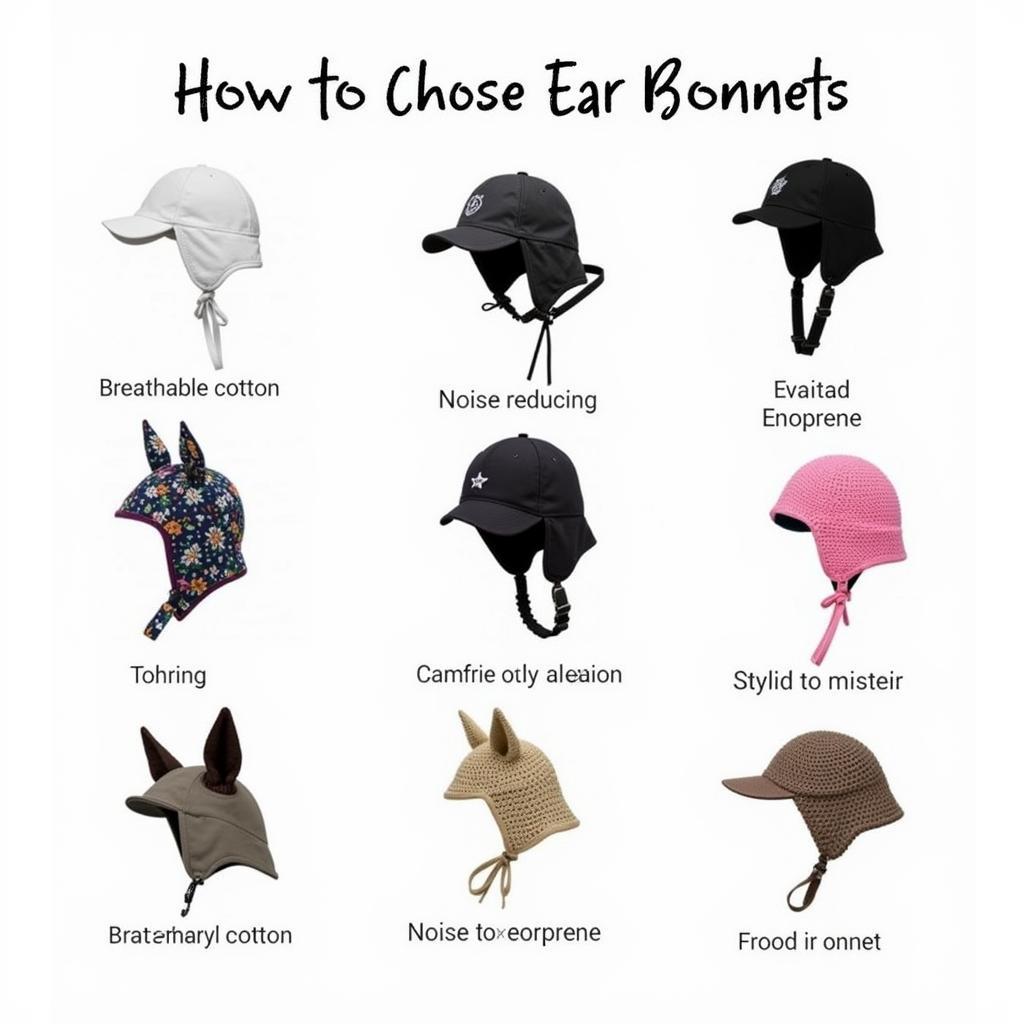Ear bonnets for horses are more than just a fashionable accessory. They play a crucial role in protecting your equine companion from insects, debris, and excessive noise, ultimately contributing to their overall comfort and performance. Whether you’re a seasoned equestrian or a novice horse owner, understanding the benefits and choosing the right ear bonnet is essential for responsible horse care.
Choosing the right horse ear bonnets can significantly impact your horse’s well-being. From reducing distractions to offering protection from the elements, these seemingly simple pieces of equipment are invaluable for maintaining a calm and focused horse.
Understanding the Benefits of Ear Bonnets
Why use an ear bonnet for your horse? Several compelling reasons make them a worthwhile investment. Fly protection is arguably the most common reason. Pesky flies and gnats can irritate a horse’s sensitive ears, leading to head shaking, distraction, and even potential infections. A well-fitting ear bonnet creates a barrier, keeping these insects at bay. Sound dampening is another significant advantage, especially for horses sensitive to loud noises or those participating in competitions. Soundproof ear bonnets for horses can help minimize distractions and maintain focus in stimulating environments. Furthermore, ear bonnets offer protection against debris and sunlight, safeguarding the delicate skin around the ears. During trail rides or outdoor activities, an ear bonnet can shield your horse’s ears from dust, dirt, and harmful UV rays.
Different Types of Ear Bonnets
Various types of ear bonnets cater to specific needs and preferences. Horse ear bonnet materials range from breathable cotton for everyday use to noise-reducing neoprene for competition settings. Crochet ear bonnets offer a stylish alternative while still providing basic fly protection. Some ear bonnets even incorporate fly repellent properties for added defense. When choosing an ear bonnet, consider the intended use, climate, and your horse’s individual sensitivities.
Dr. Emily Carter, a renowned equine veterinarian, emphasizes the importance of selecting appropriate materials: “Breathable fabrics like cotton are ideal for everyday use in warmer climates, preventing overheating and discomfort. For competition settings, consider noise-reducing materials that can help your horse stay focused amidst distractions.”
How to Choose the Right Ear Bonnet
Finding the right ear bonnet involves considering several factors. Proper fit is paramount for both comfort and effectiveness. A too-tight bonnet can restrict blood flow and cause irritation, while a too-loose bonnet may slip or become ineffective. Measure your horse’s ears carefully and refer to sizing charts to ensure a snug yet comfortable fit. Hat for horse options also offer sun protection in addition to ear coverage. Consider the climate and environment. In hotter climates, opt for breathable materials. For competition, choose a noise-reducing bonnet.
Caring for Your Horse’s Ear Bonnet
Proper care and maintenance can extend the life of your horse’s ear bonnet. Regular cleaning is essential to remove dirt, sweat, and insect repellent. Most ear bonnets are machine washable, but always check the manufacturer’s instructions. Allow the bonnet to air dry completely before use to prevent mildew and maintain its shape. Store ear bonnets in a clean, dry place away from direct sunlight to prevent fading and deterioration.
Do All Horses Need an Ear Bonnet?
While not strictly necessary for all horses, ear bonnets offer valuable protection and comfort in various situations. Horses particularly sensitive to flies, noise, or sunlight will benefit significantly from wearing an ear bonnet. Even horses that are generally tolerant can experience improved focus and reduced stress with the added protection an ear bonnet provides. A hobby horse ear bonnet might seem frivolous, but it fosters early understanding of horse care and equipment.
 Various Types of Horse Ear Bonnets Displayed
Various Types of Horse Ear Bonnets Displayed
In conclusion, ear bonnets are a valuable addition to any horse’s wardrobe. From protecting against insects and debris to minimizing noise distractions, they offer numerous benefits that contribute to your horse’s overall well-being and performance. Choosing the right ear bonnet and providing proper care will ensure its effectiveness and longevity.
FAQ
-
Can I leave an ear bonnet on my horse overnight? Generally, it’s best to remove the ear bonnet at night to allow the horse’s ears to breathe and prevent any potential rubbing or discomfort.
-
How do I know if the ear bonnet fits correctly? A properly fitting ear bonnet should be snug but not tight. You should be able to fit two fingers comfortably between the bonnet and your horse’s ears.
-
What material is best for hot weather? Breathable fabrics like cotton are ideal for hot weather, as they allow air circulation and prevent overheating.
-
Can ear bonnets help with head shaking? While ear bonnets can provide some relief from flies and other irritants that may contribute to head shaking, it’s important to consult a veterinarian to rule out any underlying medical conditions.
-
Are there different sizes of ear bonnets? Yes, ear bonnets come in various sizes to accommodate different breeds and head sizes. Measure your horse’s ears carefully to ensure a proper fit.
-
Can I use a human ear warmer on my horse? No, human ear warmers are not designed for horses and may not fit properly or provide adequate protection.
-
How often should I wash my horse’s ear bonnet? Regular cleaning, ideally after each use or at least weekly, is recommended to remove dirt and sweat.
John Stevens, a seasoned horse trainer, shares his perspective: “A comfortable and well-fitting ear bonnet can make a world of difference in a horse’s demeanor, particularly during training or competition. It’s a small investment that yields significant benefits in terms of focus and relaxation.”
For further information on horse care and equestrian equipment, explore our other articles on horse ear bonnets.
Need assistance with choosing the right ear bonnet for your horse? Contact us at Phone Number: 0772127271, Email: [email protected] Or visit us at: QGM2+WX2, Vị Trung, Vị Thuỷ, Hậu Giang, Việt Nam. We have a 24/7 customer service team ready to help.